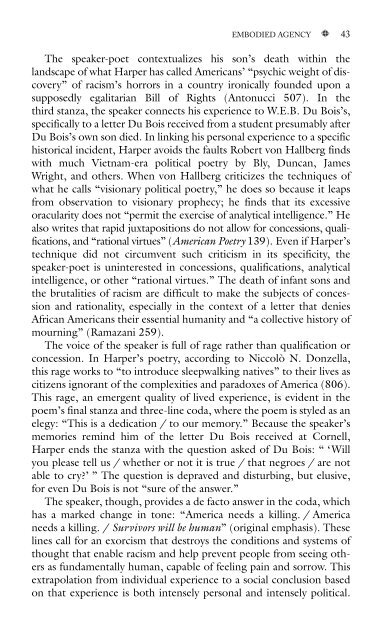american political poetry in the 21st century - STIBA Malang
american political poetry in the 21st century - STIBA Malang
american political poetry in the 21st century - STIBA Malang
Create successful ePaper yourself
Turn your PDF publications into a flip-book with our unique Google optimized e-Paper software.
EMBODIED AGENCY 43<br />
The speaker-poet contextualizes his son’s death with<strong>in</strong> <strong>the</strong><br />
landscape of what Harper has called Americans’ “psychic weight of discovery”<br />
of racism’s horrors <strong>in</strong> a country ironically founded upon a<br />
supposedly egalitarian Bill of Rights (Antonucci 507). In <strong>the</strong><br />
third stanza, <strong>the</strong> speaker connects his experience to W.E.B. Du Bois’s,<br />
specifically to a letter Du Bois received from a student presumably after<br />
Du Bois’s own son died. In l<strong>in</strong>k<strong>in</strong>g his personal experience to a specific<br />
historical <strong>in</strong>cident, Harper avoids <strong>the</strong> faults Robert von Hallberg f<strong>in</strong>ds<br />
with much Vietnam-era <strong>political</strong> <strong>poetry</strong> by Bly, Duncan, James<br />
Wright, and o<strong>the</strong>rs. When von Hallberg criticizes <strong>the</strong> techniques of<br />
what he calls “visionary <strong>political</strong> <strong>poetry</strong>,” he does so because it leaps<br />
from observation to visionary prophecy; he f<strong>in</strong>ds that its excessive<br />
oracularity does not “permit <strong>the</strong> exercise of analytical <strong>in</strong>telligence.” He<br />
also writes that rapid juxtapositions do not allow for concessions, qualifications,<br />
and “rational virtues” (American Poetry 139). Even if Harper’s<br />
technique did not circumvent such criticism <strong>in</strong> its specificity, <strong>the</strong><br />
speaker-poet is un<strong>in</strong>terested <strong>in</strong> concessions, qualifications, analytical<br />
<strong>in</strong>telligence, or o<strong>the</strong>r “rational virtues.” The death of <strong>in</strong>fant sons and<br />
<strong>the</strong> brutalities of racism are difficult to make <strong>the</strong> subjects of concession<br />
and rationality, especially <strong>in</strong> <strong>the</strong> context of a letter that denies<br />
African Americans <strong>the</strong>ir essential humanity and “a collective history of<br />
mourn<strong>in</strong>g” (Ramazani 259).<br />
The voice of <strong>the</strong> speaker is full of rage ra<strong>the</strong>r than qualification or<br />
concession. In Harper’s <strong>poetry</strong>, accord<strong>in</strong>g to Niccolò N. Donzella,<br />
this rage works to “to <strong>in</strong>troduce sleepwalk<strong>in</strong>g natives” to <strong>the</strong>ir lives as<br />
citizens ignorant of <strong>the</strong> complexities and paradoxes of America (806).<br />
This rage, an emergent quality of lived experience, is evident <strong>in</strong> <strong>the</strong><br />
poem’s f<strong>in</strong>al stanza and three-l<strong>in</strong>e coda, where <strong>the</strong> poem is styled as an<br />
elegy: “This is a dedication / to our memory.” Because <strong>the</strong> speaker’s<br />
memories rem<strong>in</strong>d him of <strong>the</strong> letter Du Bois received at Cornell,<br />
Harper ends <strong>the</strong> stanza with <strong>the</strong> question asked of Du Bois: “ ‘Will<br />
you please tell us / whe<strong>the</strong>r or not it is true / that negroes / are not<br />
able to cry?’ ” The question is depraved and disturb<strong>in</strong>g, but elusive,<br />
for even Du Bois is not “sure of <strong>the</strong> answer.”<br />
The speaker, though, provides a de facto answer <strong>in</strong> <strong>the</strong> coda, which<br />
has a marked change <strong>in</strong> tone: “America needs a kill<strong>in</strong>g. / America<br />
needs a kill<strong>in</strong>g. / Survivors will be human” (orig<strong>in</strong>al emphasis). These<br />
l<strong>in</strong>es call for an exorcism that destroys <strong>the</strong> conditions and systems of<br />
thought that enable racism and help prevent people from see<strong>in</strong>g o<strong>the</strong>rs<br />
as fundamentally human, capable of feel<strong>in</strong>g pa<strong>in</strong> and sorrow. This<br />
extrapolation from <strong>in</strong>dividual experience to a social conclusion based<br />
on that experience is both <strong>in</strong>tensely personal and <strong>in</strong>tensely <strong>political</strong>.










